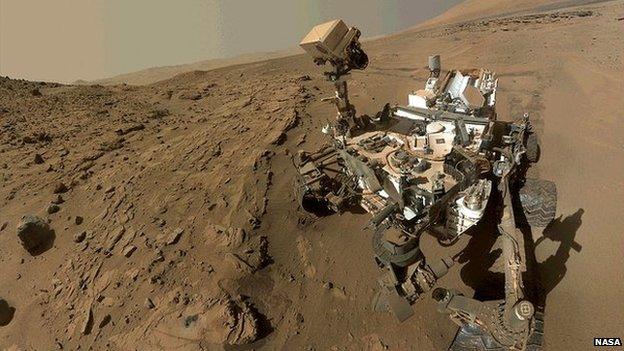Possible fatty acid detected on Mars
- Published

Curiosity's landing site of Gale Crater was once home to a lake
A fatty acid might be among organic molecules discovered on Mars by Nasa's Curiosity rover.
However, it's not possible at this stage to determine whether the compound has a biological or non-biological origin.
And contamination could still be responsible for the finding.
The results come from Curiosity's SAM instrument, and were presented at the
Nasa scientist Daniel Glavin described the results from the first "wet chemistry" experiment carried out by Curiosity.
A long-chain carboxylic acid, or fatty acid, was a good fit for one of the data peaks detected in a mudstone called Cumberland, he told an audience at the meeting. A long-chain alcohol molecule may also be among the compounds analysed.
The preliminary result will excite scientists because fatty acids are key components of the cell membranes found in all life forms, including microbial organisms.
Dr Glavin told an audience that the result was "provocative", and said the link to biology was the "million-dollar question". But he explained that a non-biological origin was equally plausible at this stage of the research.
One scientist commenting on the presentation suggested that contamination could not be ruled out as a cause of the signal.
The SAM team have been working to address the leak of a pre-existing chemical called MTBSTFA within the instrument.
The fact this is also an organic molecule has complicated the search for indigenous carbon-containing compounds in Martian rocks.
However, team members say they have turned the leak into an advantage, using their understanding of how MTBSTFA reacts with other compounds to identify Martian organics.
Curiosity landed on the Red Planet in August 2012, on a mission to explore Gale Crater, which billions of years ago would have held a lake.
The instrument team has previously reported evidence of chlorobenzene in the same rock, from the Martian area known as Yellowknife Bay.
Follow Paul .
- Published28 January 2015
- Published14 January 2015
- Published9 December 2014